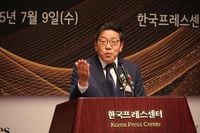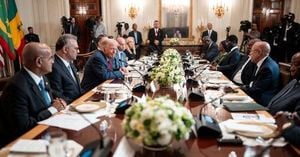On July 8 and 9, 2025, the Foreign Language Newspapers Association of Korea (FNA) commemorated a decade of dedicated service to foreign-language journalism with a series of events held at the Korea Press Center in central Seoul. Established in 2015, the association has played a pivotal role in delivering South Korea's political, economic, and cultural stories to an international audience, bridging linguistic and cultural divides in an era marked by global tensions and rapid change.
The milestone celebrations drew a distinguished crowd of lawmakers, diplomats, media executives, business leaders, and veteran journalists. Among the attendees were Qatari Ambassador Khalid Ebrahim Al-Hamar, Moroccan Ambassador Chafik Rachadi, Chinese Ambassador Dai Bing, and senior figures from South Korea’s major political parties, including Democratic Party floor leader Kim Byung-kee, People Power Party floor leader Song Eon-seog, and Reform Party floor leader Chun Ha-ram. Representatives from leading South Korean conglomerates such as Samsung and Hyundai also lent their presence, underscoring the event’s significance within both media and business spheres.
Choi Jin-young, chairman of the FNA and CEO of Herald Media Group, which publishes The Korea Herald and Herald Economy, delivered a compelling opening speech that captured the evolving role of journalism in contemporary society. “Media does not exist just to pass along the news,” Choi asserted. “We connect. We shed light. We create empathy. Journalism is what keeps democracy alive.” He emphasized that the association’s mission goes beyond merely sharing South Korea’s story with the world; it also involves making complex global developments relatable and meaningful to domestic readers.
Choi’s remarks resonated deeply amid an age of disinformation and political polarization, a theme echoed by many speakers throughout the event. He also took the opportunity to honor the founding members and veteran journalists who had been instrumental in establishing the association, including Kwak Young-kil, chairman of Aju News Corporation; Oh Young-jin, president of The Korea Times; and Yang Ki-hyun, a media executive at Joongang Daily.
National Assembly Speaker Woo Won-sik, unable to attend in person due to parliamentary obligations, sent a video message celebrating the association’s achievements. He praised the FNA for promoting “the values of creativity, diversity, and inclusion” and for narrowing the distance between nations through journalism. “The National Assembly also recognizes the importance of open communication with the global community, and we will do our part to help South Korea play a greater role in the world,” Woo stated.
The ceremony also featured remarks from several foreign envoys, including Chinese Ambassador Dai Bing, who acknowledged the association’s efforts but voiced concerns about certain portrayals of China in South Korean media. He cautioned against “distorted analysis” and the uncritical echoing of narratives such as the so-called “China collapse” or “China threat,” warning that such perspectives risk misleading the public and harming bilateral cooperation. Highlighting the robust ties between the two countries, Dai noted that over 7 million people traveled between China and South Korea last year, supported by more than 1,200 direct flights weekly. He encouraged Korean journalists to visit China to gain “a fuller, more detailed and more authentic picture” of the country.
A highlight of the celebrations was the recognition of outstanding journalists who have contributed significantly to foreign-language journalism and the promotion of Korean culture abroad. Yim Seung-hye, head of the News Team at the Korea JoongAng Daily, was honored as one of the most outstanding reporters of the year for her exceptional efforts in promoting Korean culture and heritage, as well as boosting online readership. Other awardees included Ji Da-gyum from the Korea Herald; Lim Mee-young and Shin Jin-young from the Korea Times; and Lee Ah-hyun from Aju Daily. These awards were presented by Choi Jin-young himself.
In a separate category, the Seoul Mayor’s Award was bestowed upon four journalists recognized for their adept portrayal of the capital city to a global audience. Recipients included Yoon So-yeon from the Korea JoongAng Daily, Kim Jae-heun from the Korea Herald, Park Han-sol from the Korea Times, and Jin Se-na from Aju Daily. Their work has been instrumental in showcasing Seoul’s dynamic culture and developments to international readers.
The event was a vibrant gathering that not only celebrated a decade of progress but also underscored the critical role of foreign-language journalism in fostering understanding and empathy amid a complex geopolitical landscape. Speakers from across the political spectrum, including Democratic Party floor leader Kim Byung-kee, People Power Party floor leader Song Eon-seog, and Reform Party floor leader Chun Ha-ram, delivered congratulatory remarks that reflected a shared commitment to supporting a free and responsible press.
Lee Kyu-youn, senior secretary for public relations and communication at the presidential office, also addressed the assembly, highlighting the government's recognition of the media’s role in shaping South Korea’s global image. The presence of such a diverse and influential audience illustrated the broad support for the association’s mission and the vital place foreign-language journalism holds within the country’s media ecosystem.
As the Foreign Language Newspapers Association of Korea steps into its second decade, it faces both challenges and opportunities. The rapid evolution of digital media, the proliferation of misinformation, and shifting geopolitical dynamics demand a press that is not only accurate and impartial but also empathetic and connected to its audience. The association’s commitment to these principles, as articulated by Choi Jin-young, positions it to continue serving as a crucial bridge between South Korea and the world.
Reflecting on the past ten years, the association has grown from a fledgling coalition to a respected institution that amplifies South Korea’s voice on the global stage. Its members have consistently delivered stories that highlight the nation’s rich culture, technological innovation, and diplomatic endeavors, helping to foster a more nuanced understanding among international readers.
In the words of Choi Jin-young, “Our job is to turn global issues in peace, culture, technology, and diplomacy into stories that matter to our readers here.” This mission remains as relevant today as ever, ensuring that the Foreign Language Newspapers Association of Korea will continue to illuminate the path forward in a complex and interconnected world.




